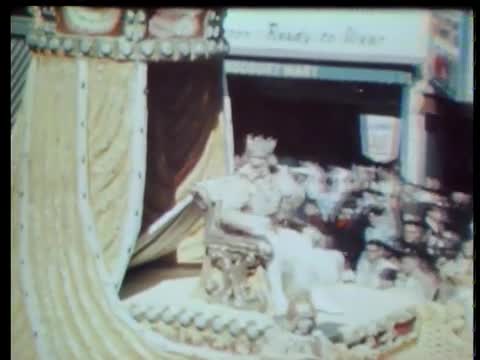Black Journal; 11
- Series
- Black Journal
- Episode Number
- 11
- Producing Organization
- WNET (Television station : New York, N.Y.)
- Contributing Organization
- Library of Congress (Washington, District of Columbia)
- AAPB ID
- cpb-aacip/512-7659c6sv19
- NOLA Code
- BLJL
If you have more information about this item than what is given here, or if you have concerns about this record, we want to know! Contact us, indicating the AAPB ID (cpb-aacip/512-7659c6sv19).
- Description
- Episode Description
- These episodes contain tributes to labor leader A. Philip Randolph, who celebrates his 80th birthday on April 15th, and Paul Robeson Sr., on the 71st anniversary of his birth. The segment on black culture in the Deep South ranges from the jazz and classical work of New Orleans composer Roger Dickerson to the modern dance expressions of a student group at North Carolina College in Durham. In each case, the objective is "inner self-development," in the words of Dickerson. Or, it is expression "relevant to black beauty," which draws on the "texture of an entire life," according to artist John Biggers. The segment shows murals, paintings and sculptures relating the black experience by student artists at Texas Southern University in Houston. Biggers, a professor at the university, notes that today's black artists are choosing their "colors from the earth." Dickerson's creativity is seen through his jazz pieces, which he interprets with a jazz combo at Sylvia's, a Bourbon Street club; and through "The Negro Speaks of Rivers," a classical song based on Langston Hughes' poem of the same name. "Black Journal" also studies the jazz scene in New Orleans, interviewing Professor Longhair, a local musician for the past 40 years. The Dashiki Theater, a New Orleans troupe associated with Dillard College, is seen rehearsing an improvisatory piece on marital infidelity. Ted Gillian, theater director, explains that the group seeks "corrective images for the black man in the South." The segment on economics depicts the Avondale Shipyards in New Orleans, where company president Zack Carter boasts of the company's hiring record with blacks and notes that unionization has been voted down overwhelmingly. Larry Cager, acting director of the Urban League, argues that blacks are primarily employed at low levels. The few who reach higher levels are paid less than whites in comparable positions, Cager notes. The segment also reports on the plight of the East Georgia Farmers' Cooperative, which is thwarted in its attempt to but a local gas station that would provide low-cost fuel for farm equipment. Crawfordville Enterprises, a manufacturing venture which has been organized by Southern Rural Action Project, is seen in its current fundless state. SRAP head Randolph Blackwell explains the cutoff of funds by the Office of Economic Opportunity, but stresses that the black man's chances for economic health lie in the area of manufacturing. "Black Journal #11" is an NET production (Description adapted from documents in the NET Microfiche)
- Series Description
- Black Journal began as a monthly series produced for, about, and - to a large extent - by black Americans, which used the magazine format to report on relevant issues to black Americans. Starting with the October 5, 1071 broadcast, the show switched to a half-hour weekly format that focused on one issue per week, with a brief segment on black news called "Grapevine." Beginning in 1973, the series changed back into a hour long show and experimented with various formats, including a call-in portion. From its initial broadcast on June 12, 1968 through November 7, 1972, Black Journal was produced under the National Educational Television name. Starting on November 14, 1972, the series was produced solely by WNET/13. Only the episodes produced under the NET name are included in the NET Collection. For the first part of Black Journal, episodes are numbered sequential spanning broadcast seasons. After the 1971-72 season, which ended with episode #68, the series started using season specific episode numbers, beginning with #301. The 1972-73 season spans #301 - 332, and then the 1973-74 season starts with #401. This new numbering pattern continues through the end of the series.
- Broadcast Date
- 1969-04-28
- Asset type
- Episode
- Topics
- Race and Ethnicity
- Media type
- Moving Image
- Duration
- 00:58:35
- Credits
-
-
Executive Producer: Greaves, William
Host: Greaves, William
Host: House, Lou
Producing Organization: WNET (Television station : New York, N.Y.)
- AAPB Contributor Holdings
-
Library of Congress
Identifier: 1999557-3 (MAVIS Item ID)
Generation: Copy: Access
Color: Color
-
Library of Congress
Identifier: 1999557-2 (MAVIS Item ID)
Generation: Master
Color: Color
If you have a copy of this asset and would like us to add it to our catalog, please contact us.
- Citations
- Chicago: “Black Journal; 11,” 1969-04-28, Library of Congress, American Archive of Public Broadcasting (GBH and the Library of Congress), Boston, MA and Washington, DC, accessed February 2, 2026, http://americanarchive.org/catalog/cpb-aacip-512-7659c6sv19.
- MLA: “Black Journal; 11.” 1969-04-28. Library of Congress, American Archive of Public Broadcasting (GBH and the Library of Congress), Boston, MA and Washington, DC. Web. February 2, 2026. <http://americanarchive.org/catalog/cpb-aacip-512-7659c6sv19>.
- APA: Black Journal; 11. Boston, MA: Library of Congress, American Archive of Public Broadcasting (GBH and the Library of Congress), Boston, MA and Washington, DC. Retrieved from http://americanarchive.org/catalog/cpb-aacip-512-7659c6sv19
